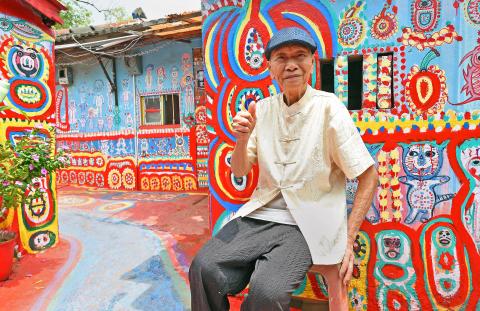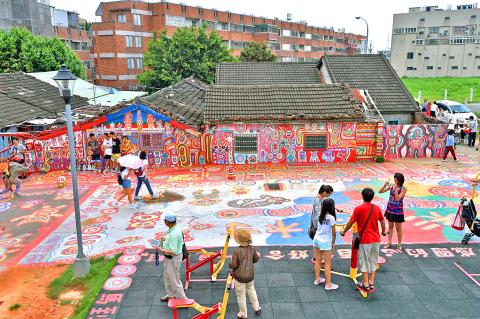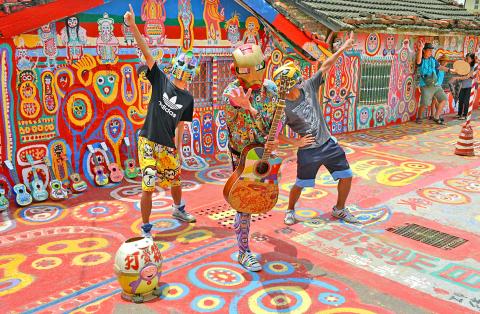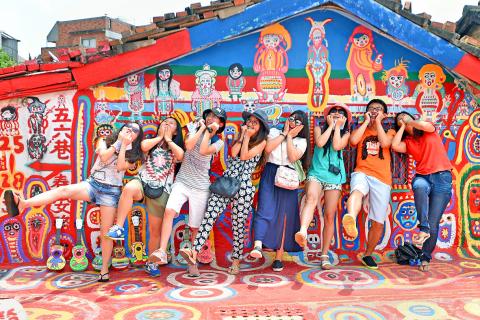Huang Yung-fu (黃永阜) greets visitors to his village in central Taiwan with paint-stained hands and shoes spattered with flecks of color, a sign of the daily artistic labor that has seen him single-handedly stave off the developers’ bulldozers.
At 93 years old, the former soldier still gets up at 3am every day to spend four hours daubing the walls of the small settlement with colorful figures, from birds and animals to celebrity singers and sportsmen.
Known as “Rainbow Grandpa,” Huang’s artwork has kept the village safe as the surrounding area has been flattened.

Photo: Sam Yeh, AFP
He walks with a slight limp and rolls up his trouser leg to reveal a bandaged knee — bruised from spending too much time kneeling on the ground to paint, he says.
However, Huang is determined to continue adding to the vibrant murals that decorate the walls and pathways of the veterans’ village or juan cun (眷村) as a way to ensure its survival.
“We had a letter five years ago saying the government wanted to knock it down to build something new. They said we could take some money or move to a different house,” said Huang, dapper in a navy flat cap and gold Chinese-style high-collared shirt. “But I didn’t want to move. This is the only real home I’ve ever known in Taiwan.”

Photo: Sam Yeh, AFP
The settlement in Taichung’s Nantun District (南屯) once comprised 1,200 homes for veterans and their families, but as the decades-old accommodation became run-down, developers snapped up the land and residents were offered NT$2 million (US$61,028 at current exchange rates) compensation or new housing.
Huang has lived there for 37 years, staying even after his neighbors abandoned their homes and only 11 houses remained. That is when he decided to paint.
“I was the only person left in the village and I was bored,” he said. “My father taught me how to paint when I was five years old, but I hadn’t done it since I was a child. “The first thing I painted was a bird inside my house.”

Photo: Sam Yeh, AFP
Huang decorated the interior of his two-bedroom bungalow, then the outer walls and the neighboring homes, which were standing empty. The ever-expanding artwork became a parade of dogs, cats, planes and his favorite celebrities, including kung fu legend Bruce Lee (李小龍).
When local university students discovered Huang’s work they launched a campaign to save the village and four years ago the authorities agreed it should be preserved. Now it is one of the area’s leading tourist attractions, pulling in more than a million visitors annually, mostly from Asia.
“The government has promised me they will keep this house and this village,” Huang said. “I was so happy and thankful.”

Photo: Sam Yeh, AFP
Officials say they are seeking to make the “Rainbow Village” a designated cultural area.
“Tourism is one of the reasons to keep it, but the main reason is that veterans’ villages are very special to Taiwan,” says Huang Ming-heng (黃名亨), chief secretary of the Taichung Cultural Affairs Bureau. “Unfortunately most of them have been knocked down, so it’s important to keep this historical memory.”
“I think they are amazing graphics — this place should be preserved,” said Hsiao Chi, 19, a student from Taipei.
“The color and the drawings are very special,” said Ivy Ng, 30, from Hong Kong, who was visiting Taichung with her family.
Originally from Hong Kong, Huang Yung-fu joined the Nationalist army in 1946 to fight Chinese Communist Party troops in China during the Chinese Civil War.
When the Chinese Nationalist Party (KMT) was defeated in 1949, many troops followed its leader, Chiang Kai-shek (蔣介石), as he fled to Taiwan. They were given temporary housing in hundreds of dedicated military villages across the island — which became permanent over the years.
The Ministry of National Defense says many of the villages have been knocked down because residents wanted better living conditions, but some bemoan the loss of the old communities.
“When they move out, people feel isolated,” said Kang Han-ming, a former marine who manages the thriving Rainbow Village business and campaigns to protect the remaining settlements. “They feel they have no roots. That’s why a lot of older veterans who move to new buildings get sick.”
The ministry has now pledged to preserve the last 13 villages as cultural areas.
Huang Yung-fu says he never tires of the early morning regime that served to save his home — a bungalow crammed with paints, marker pens and memorabilia.
The Rainbow Grandpa sits back on a chair in the shade and watches the crowds.
“I like speaking with them and they tell me the paintings are beautiful. I’ll never get lonely with all these visitors,” he said.

Alain Robert, known as the "French Spider-Man," praised Alex Honnold as exceptionally well-prepared after the US climber completed a free solo ascent of Taipei 101 yesterday. Robert said Honnold's ascent of the 508m-tall skyscraper in just more than one-and-a-half hours without using safety ropes or equipment was a remarkable achievement. "This is my life," he said in an interview conducted in French, adding that he liked the feeling of being "on the edge of danger." The 63-year-old Frenchman climbed Taipei 101 using ropes in December 2004, taking about four hours to reach the top. On a one-to-10 scale of difficulty, Robert said Taipei 101

Nipah virus infection is to be officially listed as a category 5 notifiable infectious disease in Taiwan in March, while clinical treatment guidelines are being formulated, the Centers for Disease Control (CDC) said yesterday. With Nipah infections being reported in other countries and considering its relatively high fatality rate, the centers on Jan. 16 announced that it would be listed as a notifiable infectious disease to bolster the nation’s systematic early warning system and increase public awareness, the CDC said. Bangladesh reported four fatal cases last year in separate districts, with three linked to raw date palm sap consumption, CDC Epidemic Intelligence

Taiwanese and US defense groups are collaborating to introduce deployable, semi-autonomous manufacturing systems for drones and components in a boost to the nation’s supply chain resilience. Taiwan’s G-Tech Optroelectronics Corp subsidiary GTOC and the US’ Aerkomm Inc on Friday announced an agreement with fellow US-based Firestorm Lab to adopt the latter’s xCell, a technology featuring 3D printers fitted in 6.1m container units. The systems enable aerial platforms and parts to be produced in high volumes from dispersed nodes capable of rapid redeployment, to minimize the risk of enemy strikes and to meet field requirements, they said. Firestorm chief technology officer Ian Muceus said

MORE FALL: An investigation into one of Xi’s key cronies, part of a broader ‘anti-corruption’ drive, indicates that he might have a deep distrust in the military, an expert said China’s latest military purge underscores systemic risks in its shift from collective leadership to sole rule under Chinese President Xi Jinping (習近平), and could disrupt its chain of command and military capabilities, a national security official said yesterday. If decisionmaking within the Chinese Communist Party has become “irrational” under one-man rule, the Taiwan Strait and the regional situation must be approached with extreme caution, given unforeseen risks, they added. The anonymous official made the remarks as China’s Central Military Commission Vice Chairman Zhang Youxia (張又俠) and Joint Staff Department Chief of Staff Liu Zhenli (劉振立) were reportedly being investigated for suspected “serious